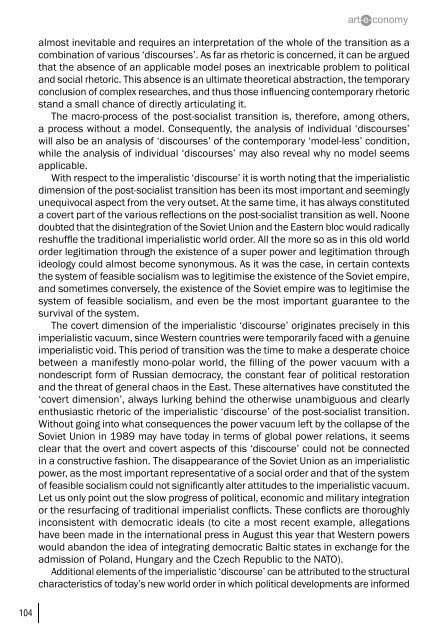art-e-conomy _ reader - marko stamenkovic
art-e-conomy _ reader - marko stamenkovic
art-e-conomy _ reader - marko stamenkovic
Create successful ePaper yourself
Turn your PDF publications into a flip-book with our unique Google optimized e-Paper software.
104<br />
almost inevitable and requires an interpretation of the whole of the transition as a<br />
combination of various ‘discourses’. As far as rhetoric is concerned, it can be argued<br />
that the absence of an applicable model poses an inextricable problem to political<br />
and social rhetoric. This absence is an ultimate theoretical abstraction, the temporary<br />
conclusion of complex researches, and thus those influencing contemporary rhetoric<br />
stand a small chance of directly <strong>art</strong>iculating it.<br />
The macro-process of the post-socialist transition is, therefore, among others,<br />
a process without a model. Consequently, the analysis of individual ‘discourses’<br />
will also be an analysis of ‘discourses’ of the contemporary ‘model-less’ condition,<br />
while the analysis of individual ‘discourses’ may also reveal why no model seems<br />
applicable.<br />
With respect to the imperalistic ‘discourse’ it is worth noting that the imperialistic<br />
dimension of the post-socialist transition has been its most important and seemingly<br />
unequivocal aspect from the very outset. At the same time, it has always constituted<br />
a covert p<strong>art</strong> of the various reflections on the post-socialist transition as well. Noone<br />
doubted that the disintegration of the Soviet Union and the Eastern bloc would radically<br />
reshuffle the traditional imperialistic world order. All the more so as in this old world<br />
order legitimation through the existence of a super power and legitimation through<br />
ideology could almost become synonymous. As it was the case, in certain contexts<br />
the system of feasible socialism was to legitimise the existence of the Soviet empire,<br />
and sometimes conversely, the existence of the Soviet empire was to legitimise the<br />
system of feasible socialism, and even be the most important guarantee to the<br />
survival of the system.<br />
The covert dimension of the imperialistic ‘discourse’ originates precisely in this<br />
imperialistic vacuum, since Western countries were temporarily faced with a genuine<br />
imperialistic void. This period of transition was the time to make a desperate choice<br />
between a manifestly mono-polar world, the filling of the power vacuum with a<br />
nondescript form of Russian democracy, the constant fear of political restoration<br />
and the threat of general chaos in the East. These alternatives have constituted the<br />
‘covert dimension’, always lurking behind the otherwise unambiguous and clearly<br />
enthusiastic rhetoric of the imperialistic ‘discourse’ of the post-socialist transition.<br />
Without going into what consequences the power vacuum left by the collapse of the<br />
Soviet Union in 1989 may have today in terms of global power relations, it seems<br />
clear that the overt and covert aspects of this ‘discourse’ could not be connected<br />
in a constructive fashion. The disappearance of the Soviet Union as an imperialistic<br />
power, as the most important representative of a social order and that of the system<br />
of feasible socialism could not significantly alter attitudes to the imperialistic vacuum.<br />
Let us only point out the slow progress of political, economic and military integration<br />
or the resurfacing of traditional imperialist conflicts. These conflicts are thoroughly<br />
inconsistent with democratic ideals (to cite a most recent example, allegations<br />
have been made in the international press in August this year that Western powers<br />
would abandon the idea of integrating democratic Baltic states in exchange for the<br />
admission of Poland, Hungary and the Czech Republic to the NATO).<br />
Additional elements of the imperialistic ‘discourse’ can be attributed to the structural<br />
characteristics of today’s new world order in which political developments are informed


